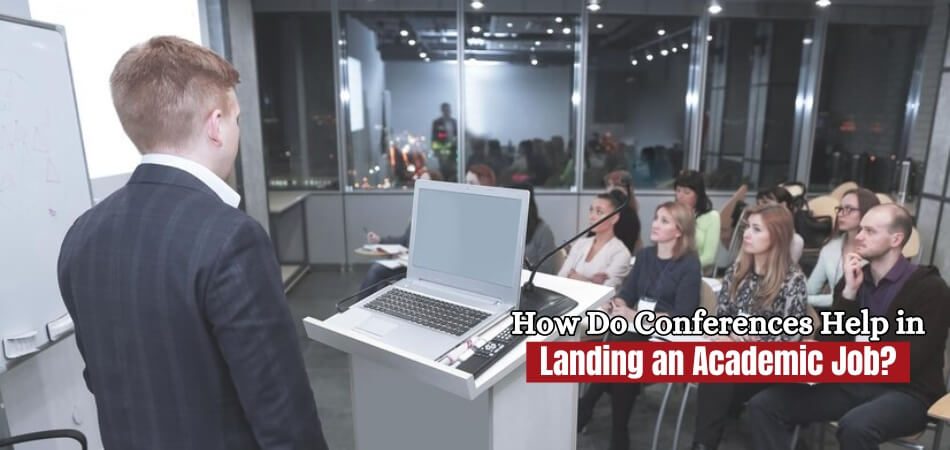Conferences are more than just gatherings—they’re gateways to academic growth. Whether you’re a graduate student or a seasoned researcher, conferences offer unique opportunities to connect, learn, and advance your career. But how do conferences help in landing an academic job?
By attending conferences, you build professional networks, present your research, and gain insights into emerging trends. These interactions not only enhance your credibility but also make you more visible to potential employers, increasing your chances of securing an academic position.
Curious to learn how you can leverage conferences to secure your dream academic job? Read on to explore effective strategies, tips, and benefits that can turn your career path.
Can Attending Conferences Improve Your Job Prospects?
In order to advance your academic career, you should consider attending conferences as a powerful strategy. These events provide an ideal environment to network, learn, and gain visibility among peers and potential employers. Here’s how attending conferences can enhance your job prospects.

Building Connections
Conferences bring together professionals, scholars, and researchers from diverse backgrounds. Engaging in discussions and conversations with experts allows you to create meaningful relationships. These connections can lead to job referrals, collaborative projects, and even recommendations, making your job search more fruitful.
Improving Communication Skills
Speaking in front of an audience or participating in discussions helps refine your communication skills. Clear, effective communication is crucial in academic roles, and the confidence gained from interacting at conferences can give you an edge in job interviews and presentations.
Showcasing Your Research
Presenting your work at conferences enhances your visibility and credibility in the academic field. It shows hiring committees that you actively contribute to your area of expertise. Moreover, presenting research provides an opportunity to receive feedback, further strengthening your work.
Learning New Trends
Conferences allow you to stay updated with the latest research, methods, and trends in your field. This knowledge not only adds depth to your expertise but also makes you a more appealing candidate during job applications, as it demonstrates your commitment to continuous learning.
Enhancing Your CV
Listing conference participation, presentations, or awards on your CV highlights your active engagement in academia. It reflects your dedication to professional development, making you a more attractive candidate for hiring committees.
So, attending conferences is more than just a learning experience—it’s a stepping stone to landing your next academic role. Make the most of these events to maximize your career potential.
How Do Conferences Help in Landing an Academic Job?
Conferences are not just learning hubs but also strategic career tools for academics. Engaging with peers, presenting research, and gaining industry insights at these events can significantly enhance your chances of landing an academic role. Here’s how they can be instrumental in shaping your career.
Networking Opportunities
Conferences bring together like-minded scholars, researchers, and hiring managers. Meeting people in your field helps build a solid network of contacts, which can be essential for securing job leads and collaborations. These relationships can lead to mentorship opportunities, reference letters, and even job recommendations.
Showcasing Expertise
Presenting your research at conferences demonstrates your subject matter expertise and commitment to your field. It gives you the platform to explain your ideas, methodology, and findings to an informed audience. This visibility can increase your credibility among potential employers, making you a stronger candidate.
Gaining Constructive Feedback
Conference discussions offer valuable feedback from seasoned professionals, peers, and other attendees. Constructive criticism helps you refine your work and identify areas for improvement. Whether it’s about finding a conference to participate in or presenting innovative ideas, the experience adds value to your professional growth.
Developing Collaborative Opportunities

Discovering Career Insights
Conferences often feature career development workshops and sessions. These sessions provide tips on dealing with academic job markets, preparing impactful CVs, and improving interview skills. Attending these sessions offers practical guidance, equipping you to present yourself effectively to hiring committees.
Increasing Visibility
Conference participation raises your profile within your academic community. Attendees often include hiring managers, academic recruiters, and senior researchers who can take note of your expertise. The more visible you are, the higher your chances of being approached for job roles or collaborations.
Demonstrating Adaptability
Attending diverse conferences helps you adapt to various academic environments and cultural norms. This adaptability is an attractive quality for hiring committees, as it reflects your ability to thrive in diverse academic settings and collaborate with colleagues from different backgrounds.
Building Confidence
Engaging in discussions, presenting research, and interacting with industry experts can significantly enhance your confidence. A confident approach during job applications and interviews makes a positive impression on recruiters. This confidence can make a difference in how you present yourself to hiring committees.
So, conferences serve as stepping stones for academic career growth. Actively participating, networking, and showcasing your work can significantly enhance your job prospects. Make the most of these opportunities to stand out as a strong contender for academic roles.
Can Presenting Research Strengthen Your Academic Profile?
Presenting research is a highly effective way to strengthen your academic profile. It showcases your expertise, provides feedback from peers, and enhances your credibility within your field. Here’s how presenting research can significantly enhance your academic journey.
Establishing Authority
Sharing your research at conferences positions you as a knowledgeable expert in your area of study. It allows you to explain your ideas, defend your methodology, and engage with questions from the audience. This not only boosts your confidence but also increases your standing among academic peers and potential employers.
Improving Research Quality
Presenting your work at conferences gives you access to valuable feedback from experienced scholars and researchers. Constructive criticism helps you refine your research, making it stronger and more impactful. This continuous improvement can lead to higher-quality publications and increased recognition in academic circles.
Improving Visibility
Presenting at conferences makes you more visible in your academic community. Activities like socializing effectively at academic conferences during presentations can further strengthen your connections. Conference presentations are often listed in academic publications, adding to your portfolio and increasing your reach. Greater visibility often leads to more invitations for speaking engagements, collaborations, and job opportunities.
Expanding Professional Networks
Presenting your work attracts like-minded researchers who may share similar interests. This can lead to collaboration opportunities, co-authorship, or even research grants. Building these professional relationships not only boosts your profile but also opens doors for career advancement.
So, presenting research is a strategic move that adds credibility to your academic profile. It helps refine your work, increases visibility, and opens doors for collaboration. Make it a priority to present your research to maximize career growth in academia.
Building Professional Relationships at Academic Conferences
Building professional relationships at academic conferences is one of the most rewarding aspects of attending these events. It’s an opportunity to connect with experts, potential collaborators, and even future employers. Here’s how to effectively nurture these relationships:
Initiating Conversations
Start by attending sessions, joining group discussions, or participating in workshops. Approach individuals by introducing yourself, sharing your research interests, and asking questions about their work. Genuine curiosity and engagement can lead to meaningful interactions and lasting professional connections.
Participating Actively
Being an active participant goes beyond just listening. Engage in Q&A sessions, join panel discussions, and offer your insights. Your active involvement not only displays your knowledge but also signals your enthusiasm, making others more inclined to approach and connect with you.
Following Up After the Conference
After establishing initial contacts, be sure to follow up. Explore different ways to follow up after a conference, such as sending personalized emails or connecting on professional platforms like LinkedIn. Maintaining communication shows your sincerity and helps turn initial meetings into long-term professional relationships.
Establishing meaningful connections requires effort and authenticity. By staying engaged and following up, you can turn brief encounters into beneficial relationships that could shape your academic career for years to come.
How to Use Conference Experiences on Your CV?
Effectively showcasing your conference experiences on your CV can significantly enhance your appeal to hiring committees. Highlighting these experiences shows potential employers that you’re active, engaged, and committed to your academic growth. Here’s how to leverage these experiences effectively:
List Conference Presentations
Include any research presentations or papers you’ve delivered at conferences. Specify the event name, date, and presentation title. This not only highlights your expertise but also shows your ability to communicate complex ideas to peers, a key skill in academia.
Mention Awards or Recognitions
If you’ve received any awards or recognitions at conferences, be sure to list them prominently. Awards for best paper or presentation demonstrate your excellence in research and presentation skills. They also emphasize your dedication to producing high-quality academic work.
Highlight Networking Achievements
If you developed professional relationships or collaborated on projects after meeting someone at a conference, mention this on your CV. These collaborations show hiring committees that you actively build networks and engage in collaborative research, which is valued in academic roles.
Include Workshops or Skills Gained
If you participated in workshops or training sessions, mention the new skills or techniques acquired. For example, you could highlight attending a workshop on advanced research methods. This demonstrates your commitment to continuous learning and development in your field.
Effectively detailing your conference experiences makes your CV more robust, showcasing your active participation and commitment to academic excellence. Personalize these experiences to each job application to maximize your chances of securing the desired role.
What Are the Best Strategies for Making the Most of Conferences?
Conferences are valuable opportunities for professional growth and career advancement. To make the most of them, you need to be well-prepared and proactive. Here are the best strategies for maximizing your conference experience:
- Prepare in Advance: Research the conference schedule, sessions, and speakers before attending. Create a personal agenda by selecting the most relevant presentations and networking events. This approach ensures you don’t miss out on the most valuable sessions.
- Engage Actively in Sessions: Be an active participant in discussions and Q&A sessions. Don’t hesitate to ask questions or share your insights. Active engagement helps you connect with speakers, leaving a positive impression and opening doors for meaningful conversations.
- Network with Intent: Set specific networking goals, such as meeting three new people or connecting with a speaker. Approach participants with a genuine interest in their work. Building authentic relationships increases the likelihood of future collaborations.
- Follow-Up Post-Conference: After the event, send personalized follow-up emails to the people you connected with. Mention specific discussions you had to make the conversation memorable. Maintaining relationships post-event can lead to long-term professional opportunities.
- Take Detailed Notes: While attending sessions, jot down important insights, names, and potential ideas for your research. Reviewing these notes later can help reinforce your learning and identify new research angles, boosting your academic productivity.
Conferences are excellent platforms for growth, learning, and career opportunities. By following these strategies, you can maximize your experience and turn each event into a stepping stone for career advancement.
Frequently Asked Questions
When exploring how conferences help in landing an academic job, many common questions arise. Addressing these queries can clarify the benefits of attending conferences and how they align with your career goals.
Do All Conferences Provide Networking Opportunities?
Not all conferences offer the same level of networking opportunities, but many are designed to foster connections. Look for events with dedicated networking sessions, workshops, or social gatherings, as these are typically great for meeting fellow academics and industry professionals. Attending such conferences can significantly expand your professional network.
Can Virtual Conferences Help With Job Searches?
Yes, virtual conferences can be beneficial for job searches, especially in today’s digital age. They provide access to global audiences and speakers that may not be available at in-person events. Engaging in online discussions and networking can still lead to valuable connections and insights into job opportunities.
Is It Essential to Present at a Conference to Gain Benefits?
While presenting at a conference can enhance your visibility, it is not strictly essential for gaining benefits. Attending sessions, networking with peers, and participating in discussions can still offer valuable insights and connections. Both active participation and observatory engagement can be fruitful in different ways.
Do Conferences Typically Include Job Fairs or Recruitment Sessions?
Many conferences do include job fairs or recruitment sessions, particularly those focused on specific academic fields. These sessions allow attendees to meet potential employers and learn about job openings. It’s wise to check the conference agenda in advance to find such opportunities.
Can Attending Multiple Conferences Improve My Academic Job Prospects?
Yes, attending multiple conferences can significantly improve your academic job prospects. Each event adds to your experience, expands your network, and increases your visibility in your field. The more you engage with the academic community, the greater your chances of being noticed by potential employers.
Conclusion
Conferences serve as powerful motivators for your academic career, providing opportunities that can shape your future. Finding out how do conferences help in landing an academic job reveals their potential to enhance your professional journey through networking, visibility, and learning.
By immersing yourself in these events, you not only present your research but also connect with influential figures in your field. Each conversation and collaboration can lead to job opportunities, mentorship, and valuable insights that enrich your academic profile.
As you plan for your next conference, keep in mind that every experience is a chance to grow and stand out. Seize these moments, and let them pave the way to your desired academic role.






